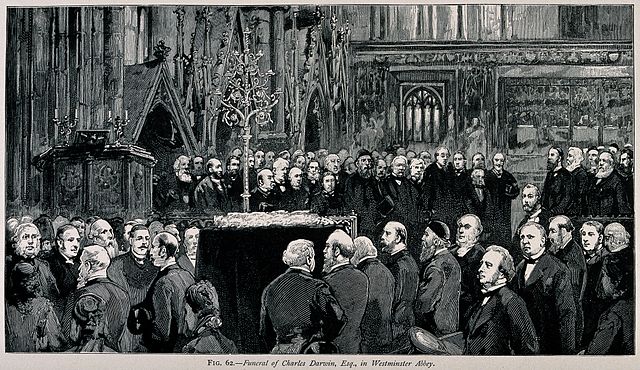
If it had been his paternal grandfather, the reason would have been clear: Erasmus Darwin was immensely fat, and reportedly had a semicircle removed from his dinner table to accommodate his belly. If it had been his father, the reason again would have been clear: Robert Darwin was about the size of Erasmus Darwin, and reportedly stopped weighing himself when he reached the twenty-four-stone, or 336-pound, mark. I don’t know how much Charles Darwin weighed, but to judge from portraits and photographs, he wasn’t anything as corpulent as his father or grandfather. So why, when he was interred in Westminster Abbey, were there ten pallbearers? Well, that’s a silly question, I admit: obviously it wasn’t because the coffin was such a burden. A lot of people wanted to pay their respects by carrying Darwin to his final rest. It happened on April 26, 1882, so to commemorate the 134th anniversary of the occasion, I thought that I’d say a little about each of the ten pallbearers, in alphabetical order.
George John Douglas Campbell, 8th Duke of Argyll (1823–1900). Campbell, who became the Duke of Argyll in 1847, was a politician who served in the cabinets of Lord Aberdeen, Lord Palmerston, Lord Russell, and William Gladstone. But he was also interested in evolution. His Reign of Law (1867) complained, “Natural Selection can originate nothing; it can only pick out and choose among the things which are originated by some other law.” But Campbell was not in principle hostile to evolution, regarding it as a possible form of “Creation by Law” (to echo the title of a chapter in his book). In his Primeval Man (1868), he wrote that “Mr. Darwin’s hypothesis…is not in itself inconsistent with the Theistic argument, or with belief in the ultimate agency and directing power of a Creative Mind”; he thought that it failed scientifically. Darwin, for his part, obviously disagreed on the latter point. But he admired his critic nevertheless, telling Hooker in 1870, “I have always thought the D. of Argyll wonderfully clever.”
William Cavendish, 7th Duke of Devonshire (1808–1891). A member of a politically and scientifically prominent family, after serving first in the House of Commons and then, as the Earl of Burlington, in the House of Lords, Cavendish became the Duke of Devonshire in 1858. He spent the bulk of his life in academia, however, serving as the chancellor of the University of London for twenty years and the chancellor of Cambridge University for thirty years. He was a noted benefactor of scientific and industrial enterprises—he founded Cambridge University’s famous Cavendish Laboratory, whose first director was James Clerk Maxwell, and whose researchers have won no fewer than twenty-nine Nobel Prizes—as well as a Fellow of the Royal Society, but his path seems not to have significantly crossed Darwin’s. In 1874, Darwin wrote, “I know nothing whatever of the D. of Devonshire & could not possibly write to him” (to solicit a donation from him for the Zoological Station at Naples).
Frederic William Farrar (1831–1903). Educated at King’s College London and Trinity College of Cambridge University, Farrar was a schoolmaster at Harrow School and Marlborough College, which doubtless provided the inspiration for his school novels, such as Eric, or, Little by Little (1858), which is credited with popularizing the name “Eric” in the Anglophone world. He was also a cleric, eventually becoming the Dean (not the Archbishop!) of Canterbury, and a philologist who applied recognizably Darwinian ideas in the discipline—even though he “inclin[ed] to the belief that species were immutable,” as his son wrote in a 1904 biography. Darwin, for his part, proposed Farrar for fellowship in the Royal Society. Farrar claimed to have suggested the idea of burying Darwin in Westminster Abbey, although John Lubbock is usually credited. He also delivered the sermon, in which he placed Darwin “among those who have not only served humanity by their genius, but have also brightened its ideal by holy lives.”
Joseph Dalton Hooker (1817–1911). The son of the famous botanist William Jackson Hooker, Hooker earned a medical degree from Glasgow University and served as assistant surgeon on the Antarctic expedition of HMS Erebus, 1839–1843. He read proofs of Darwin’s Voyage of the Beagle on the Erebus and was impressed; when he returned, Darwin recruited him to classify his botanical specimens from the Beagle voyage. The two became fast friends. Hooker was one of the first colleagues with whom Darwin discussed his ideas about natural selection, and it was he who submitted Darwin’s and Wallace’s papers to the Linnean Society in 1858. Hooker was second only to Huxley in promoting and defending Darwin’s ideas. At the same time, he enjoyed a successful career of his own, succeeding his father as the director of the Royal Botanic Gardens at Kew in 1865 and serving as the President of the Royal Society in 1873. In the 2009 movie Creation, he was convincingly played by Benedict Cumberbatch.
Thomas Henry Huxley (1825–1895). Talented but impoverished, Huxley eked out his spotty formal schooling with intensive self-education. His big chance came when he became the assistant surgeon on HMS Rattlesnake’s mission to New Guinea and Australia, 1846–1850, giving him the chance to study marine invertebrates in depth (as it were); on the strength of his work, he was elected to the Royal Society in 1850. In 1854, he became Professor of Natural History at the Royal School of Mines, where he worked on vertebrate paleontology and comparative anatomy. Initially skeptical of evolution, he was recruited by Darwin before the publication of the Origin, becoming his famous “bulldog”—although Huxley was never quite persuaded of the power of natural selection. Besides his scientific work, Huxley was also famous for his campaign to professionalize British science and to improve science education (always a favorite cause here at NCSE). As for the remaining five pallbearers, you’ll have to wait for part 2!

